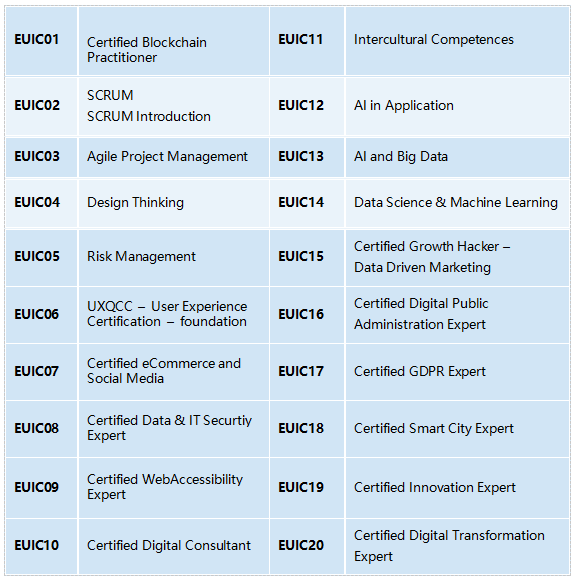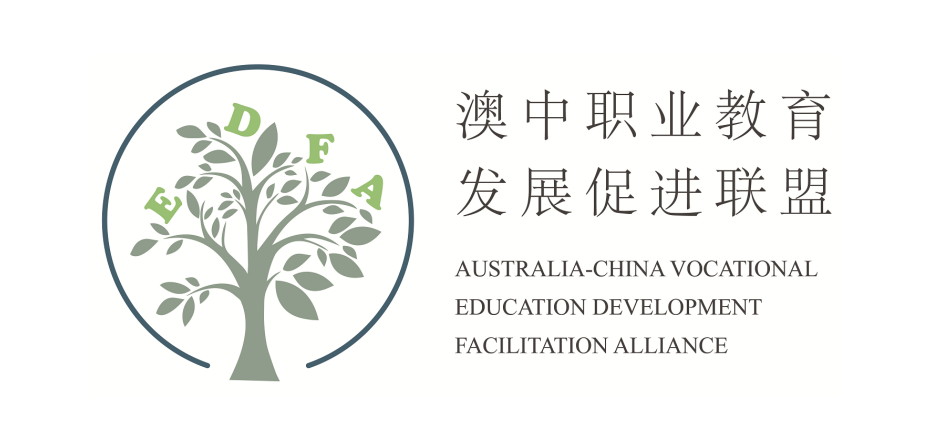In order to meet the needs of industries and enterprises for talents and the development trend of technology, Beijing AVEA introduces EU Industry Certificate courses that meet the needs of Chinese industries. Our EU Certificates courses focus on the most recent and popular technologies and cover a variety of areas including IT, Computer Science, e-Commerce, Business and Management etc.
No matter you’re expecting a promotion, looking for a new job, wanting to change career, or simply wanting to learn new skills, these courses will be able to meet your needs and add more strength to your resume.
On the other hand,The course is designed to enhance the international perspective and professionalism of teachers in vocational institutions, strengthen the quality of dual teachers and create “teachers of craftsmen” in vocational education. Through these courses, vocational teachers can deeply understand international industrial development trends, competency requirements and vocational standards, which helps to continuously improve the openness of high-end technical skills training in vocational colleges, to enhance the international vision and professional level of teachers in vocational colleges, to strengthen the quality of dual teachers, and to create a “master of craftsmanship” in vocational education.
Description
This course is suitable for vocational teachers, people working in related industry, students or graduates looking for jobs in related industries
Delivery Mode
Online live lecturing + learning platform in small classes, 15-20 students for certified classes; 30-50 students for non-certified classes
Trainers
The course will be delivered in English by experienced EU experts, with professional interpreter throughout the course.
Certification
Students who have completed the training and passed the assessment will be awarded the EU Certificate of Professional Skills; non-certified students will be awarded the European Training Agency (University) Training Certificate
What are the IST courses?
The International Skills Training (IST) courses have been developed by Australian industry, facilitated by the Australian Government, to help support the global demand for quality training and assessment skills.
There is a growing global demand for skills training that is internationally applicable, as countries seek to improve their technical vocational education and training systems (TVET), industry demands increasing numbers of skilled workers and workers seek quality, recognised training. The courses will support the training of an international workforce with the skills and capacity necessary for meeting aspirations for economic growth held by all countries.
Australia has invested heavily in ensuring its training system is based on high quality standards and is defined by the skills requirements outlined by industry. This positions Australia well to assist other countries in growing their skills capacity.
The IST courses have been developed by Australian TVET expertise and are licensed by the Australian Government for delivery by quality Australian RTOs and approved providers.
AVEA is the first and only approved provider in China to deliver IST courses.
Courses currently on offer
- TVET Trainer
- TVET Assessor
- TVET Advanced Trainer and Assessor
Countries of delivery
These non-AQF courses aim to address critical competency gaps, support global skills needs in the global workforce.
The IST Courses have been delivered in India, Latin America, Indonesia, Vietnam, Sri Lanka, Malaysia, China (including Hong Kong, Taiwan and Macau) and other countries (except Australia) around the world.
The Australian Government will closely monitor delivery and implementation to ensure the quality of the courses and make continuous improvement.
Certificate IV in Training and Assessment (TAE40116) is a nationally accredited qualification in Australia which reflects the roles of individuals delivering training and assessment services in the vocational education and training (VET) sector.

LEARN NEW SKILLS
Through a mix of theory and practical coursework, learn to:
- Design and develop learning programs
- Identify student needs and tailor training delivery
- Plan assessment activities and processes
- Assess competence
- Organise and facilitate learning in your workplace to share your industry expertise
DEVELOP YOUR TALENT
Develop the attributes to help you get ahead:
- Self-directed and self-motivated
- Comfortable working with others and reporting to a manager or supervisor
- Comfortable presenting to small and large groups
- Adaptable to change and challenges
ACHIEVE YOUR GOALS
Completing this course provides you with:
- An Australia nationally accredited trainer qualification at Certificate IV level – the minimum requirement to teach and assess vocational education and training (VET) in Australia
Career opportunities
- Enterprise trainer or assessor
- RTO trainer or assessor
- Workplace trainer or assessor
- Learning product developer
GROW YOUR CAREER
Take your career further with the:
- Diploma of Vocational Training and Education
- Diploma of Training Design and Development
In the last few years, the term “micro-credential” has been gradually well-known by the public, especially the pandemic further stimulates strong interest toward it. Micro-credentials usually provide training in a shorter or more flexible basis than traditional degree or certificates, and focus on specific skills training. Therefore, micro-credential will play an important role in workers training.
Currently, many countries and organizations have strategically begun to evaluate the contribution of micro-credentials to education, economy and society, and launched several pilot projects or corresponding policies, such as the EU, Australia, New Zealand, China, Ireland, Malaysia, Canada, the United States and the Netherlands, etc. All these development in the field of micro-credentials have demonstrated an increasingly global development trend. Micro-credentials enable learners to participate in customized short-termed or accredited studying, which reflects their lifelong learning achievements and shows the feature of flexibility, convenience and lower price. In continuing education, professional education and workforce education, micro-credentials have become increasingly popular.

Why do we need micro-credentials? Industry 4.0 and “disruptive forces like globalization, aging population, climate change and development of technology (including the use of AI)” have changed the nature of working, which leads to the skills shortage, and makes it important to upgrade skills, re-skill and develop new digital talents. So are the high tuition fees for traditional degrees, lack of alignment with employment needs and the ability to adjust for the changing circumstances. As a result, there is a growing need for learning pathways and other types of education.
Since the pandemic outbreak, national governments plan to create new jobs and address specific skill shortages for new growth area, so that there has been a surge interest in micro-credentials. The global micro-credentials related projects are gaining at a robust rate, therefore, exploring the potential of micro-credentials to enhance skills, respond to the changing nature of work and provide new lifelong learning pathways will prepare learners to meet the demands of current changing digital society.
Micro-Credentials Related Areas:
Early Childhood Education: Manage an Early Childhood Education and Care Service, Inclusive Practice and Principles in Early Childhood, Childcare First Aid and CPR Skill Set, etc.
Aged Care: Palliative Approach Skill Set, Dementia Support – Service Delivery Skill Set, Implement Falls Prevention Strategies Skill Set, Administer and Monitor Medicines and Intravenous Therapy Skill Set, Living and Learning Art and Craft, etc.
Hotel Management: Food Safety Supervision, WSET Level 1 Award in Wines, French Patisserie Baking, Introduction to Barista Skill Set, etc.
Welding: Introduction to Welding, Basic TIG Welding, Basic MIG Welding, Course in Fusion Welding to ISO 9606 for Experienced Welders, etc.
Energy engineering: GRID-CONNECTED SOLAR PV SYSTEMS DESIGN ACCREDITATION, Battery Storage Systems for Grid Connect PV Systems Skill Set, PRINCIPLES OF ELECTRICAL ENGINEERING, etc.
Vessel: Follow Vessel Security Procedures (Security Awareness Training) Skill Set, (ECDIS)Use of Electronic Chart Display and Information System (ECDIS) Skill Set, Shipboard Safety Skill Set, Marine Radio Operator’s VHF and HF Skill Set, etc.
Agriculture: Farm Business Workforce Skill Set, Farm Business Management Skill Set, Chemical Application for Agriculture Skill Set, etc.
Business: Starting and Managing a Small Business, Small Business Marketing Bundle, Basics of Online Promotion and Social Media, Accounting Principles Skill Set, etc.
Hairdressing: Barbering Skill Set, Chemical Reformation Skill Set, Pet Grooming, etc.

Flipped Learning – Three Modules:
1-Flipped Learning Module (as developed for Future Learn)
What is FL
Benefits of FL
How to Flip the Learning (Asynchronous & Synchronous Learning)
Planning your Flipped Learning
Micro-learning & Chunking (HIT Explicit Teaching)
The role of digital tools in Flipped Learning
2-Developing Self-Regulated Learners within a Flipped Learning Approach
Definition and characteristics of self-regulated learners (include self-efficacy and the growth mindset)
Benefits of self-regulated learning
Using Metacognitive Strategies to develop self-regulated learners (Learning Pit, Reflective Practice and self-efficacy)
Digital tools
3-Engaging Learners within a Flipped Learning Approach
Building a learning community
The role of teacher presence
The role of student voice
Using Collaborative Strategies to engage learners.
Digital tools
There is no doubt that the popularity of micro-credentials stems from the need for better job prospects and learning opportunities. With the help of the micro-certificate platform, people can acquire skills that are suitable for work needs or career development, and learn whenever and wherever they want. The new ear has given rise to new patterns of employment, and correspondingly eliminated traditional ones. Therefore it is urgent to help people upgrade their professional skills. With the support of micro-certificate project, people receive better education at a lower cost, so the skill gap between groups is gradually narrowing down and the human resources as well as the professional skills are improved eventually.
As an international education organisation, Australia Vocational Education Alliance (AVEA) has been dedicated in designing and delivering quality training programs to excellent teachers from vocational colleges, applied science universities around the world.
Australia Vocational Education Alliance (AVEA) has also been officially recognised as the IST Approved Partner by Australian Federal Government, which makes AVEA the first IST Approved Partner that delivers IST programs in China.






 简体中文
简体中文